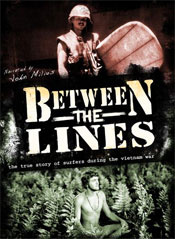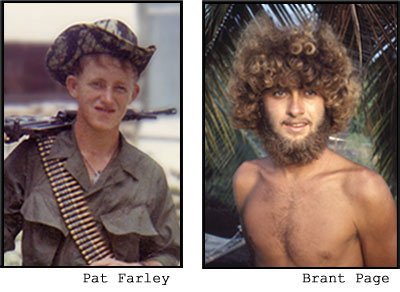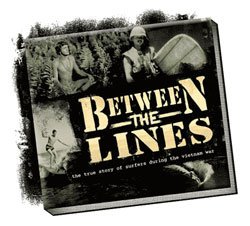 Vietnam War GIs Went Surfing in Between Killing Raids and Agent Orange Drops
Vietnam War GIs Went Surfing in Between Killing Raids and Agent Orange Drops
Special Screening for Veterans to be held on July 25th: View Trailer
*Warning: Movie Contains Graphic Violent Truths that some may find upsetting
BETWEEN THE LINES is a brand new indie movie that explores the Vietnam War through the prism of the surfing sub-culture. The film offers unique insight into the dramatic effect that the Vietnam War and draft had on young American men who rode waves.
Between the Lines explores the choice that most draft age surfers faced during the Vietnam War era: either go to war or evade the draft. It was one or the other. Between the Lines delves into the lives of two surfers who choose opposite paths: Pat Farley and Brant Page.
While following the lives of these two surfers the film chronicles the impact of the Vietnam War on the surfing lifestyle. From the peaceful shores of Hawaii to the canopy jungles of Vietnam, Between the Lines excavates the surfing cultures response to an extraordinary circumstance.
View Trailer
For Veterans and VIPS, there will be a speacial screening of the movie in Orange County California. The Orange County benefit screening of Between the Lines will be held July 25 at the Huntington Beach Art Center in Huntington Beach California.
This event will benefit the Long Beach Veterans Hospital Prosthetics and Orthotics Lab.

INTERVIEW with the films narrator, JOHN MILIUS.
By Scott Bass of Surfer Magazine
SCOTT BASS: Okay, you’ve just viewed the documentary film BETWEEN THE LINES for the first time, what are your thoughts?
JOHN MILIUS: I loved it. The two surfers are such great characters. What’s really remarkable is that the two sort of become more and more alike. At the very core of all true surfers, the core of our nature is that we really do not like authority. The film really captures that and it brought the war back and it really portrays surfing as it should be portrayed. You know, as an escape and as a culture. It’s one of the best documentaries I’ve ever seen on the Vietnam era. BETWEEN THE LINES is the real deal. This is the soil from which APOCALYPSE NOW grew out of; it’s a simple as that. The surfers go out and they do it, you know… they live the whole Charlie’s Point reality… the Colonel Kilgore experience (Laughs). It’s just wonderful.
SCOTT BASS: There have been a few Vietnam War movies that carry in them a character or theme that’s based around surfing? BIG WEDNESDAY, APOCALYPSE NOW, even PLATOON… Why do you think directors and screen writers have included surfers in their portrayal of the Vietnam War?
JOHN MILIUS: Well the Vietnam War was a California war. It was a clash of cultures between the United States and this far off Asian land. But even more than that, it was a clash between California culture and Asian culture. There was California music, and Hells Angels flames on Huey Gunships. It was a California war. I guess the surfer is a cliché for the Vietnam War in the same way that the kid from Brooklyn stuck in the B-29 tail gunner position was the World War II cliché.
SCOTT BASS: Is it true that surfing and surfers represent the ultimate freedom so the concepts are great tools for contrast?
JOHN MILIUS: Yeah I think that is part of it, but it is also the idea that the general public thinks, ‘oh my God, when I go in the Army, I’m never going to do anything even remotely as cool as surfing.’ Surfing is completely useless. There is no redeeming value, unless of course you are a surfer. In the army you can play football or baseball or box, but surfing is completely useless. But when you think about it, it’s quite logical. I mean the concept of surfing in Vietnam makes perfect sense. There is an ocean in Vietnam. There is the South China Sea. There are waves in Vietnam.
SCOTT BASS: Why is the famous surfing scene that you wrote into APOCALPYSE NOW important to the movie? What did you want us to learn?
JOHN MILIUS: Well first of all, Colonel Kilgore subjugated himself to his hero Lance (surfer). Surfing is what Kilgore loved so to have Lance in his presence; it was like having Michael Jordan or Kelly Slater in your presence. Lance was a surfing hero and like in any other sport a sports hero has a tremendous amount of weight and a tremendous amount of respect. Especially as an individual sports hero like you have in surfing. You know, Kilgore is like, ‘cool, I get to watch Lance surf." I love the idea of this mighty Colonel getting to be a kid again. You know he says to Lance, "I really admire your cutback and your nose riding." Of course it is still Kilgore’s world. He takes Charlie’s Point so the two of them can go surfing.
SCOTT BASS: That particular part of the scene, where did you get that concept?
JOHN MILIUS: The whole idea of blasting the VC off of the point so they could go surfing is an idea I got from Ariel Sharon. Sharon wanted to go skin diving near the Suez Canal. He had heard that there was a particular type of fish that lived there and Sharon wanted to go diving and see these fish. Sharon was like, ‘I’m going to go down there and GET THEIR FISH!’ (much laughter). Of course Sharon was going to be traveling by tank (laughing). You don’t get much better than Ariel Sharon. If Ariel Sharon could have been a surfer he would have been. I’m surprised he wasn’t because there is good surf in Israel.
SCOTT BASS: How do you think BETWEEN THE LINES portrays surfers in context to the average guy who had to face the draft?
JOHN MILIUS: I don’t the average guy has the balls of either Pat (Farley) or Brant (Page). I mean these guys are surfers and surfers ARE unique. Look at (Mark) Martinson. He says, "I’m not going down to that draft board. I’m a fucking surfer man (pause). I’m a surfer. I don’t hardly even wear shoes (laughter)." We are a special breed. And Farley is like that too. He says, "I don’t mind killing gooks." We’re surfers. We are individuals. You know Pat is the right wing side of it and Brant, you know, is sort of the left wing side of it, but you know that’s part of being a surfer. But they are in many ways the same because they are individualistic. Surfing IS its own culture. It’s peculiar. It’s a tribal culture. It’s not a part of normal society. We are different. We are branded. We can have jobs and everything else in society but we are different. It’s almost a religion.
SCOTT BASS: Was the Vietnam era a significant turning point for surfing as a culture?
JOHN MILIUS: Yeah, because surfers basically went hippie. Man of the land type hippies. You know, guys on Maui chanting their mantra, living off the land, eating blotter acid, surfing Honolua Bay and in their down time contemplating the ultimate Brewer gun. Now, the other significant part of surfing during that time was people like Farley. The surf media just didn’t publicize it. Surfers going to war for their country? What? They might have been viewed as slightly unhip. But they became hip again with APOCALYPSE NOW and now this film. Many, many surfers went to Vietnam. Some wanted to talk about it and others never wanted to talk about it. What is great in this film is that there is no condemnation for either group, going to war or not going to war. What is really powerful about BETWEEN THE LINES is that you can really view the era in the light of time and history. For me, this is my era, this is my generation. There is a time when you are distant enough from it that it becomes a piece of history. Like talking about the Civil War or World War I. You can see it clearly for what it is. It’s almost like a sigh of relief. It doesn’t have the weight of judgment anymore. The burden of judgment is gone.
SCOTT BASS: There are a lot of larger than life characters in the surf world.
JOHN MILIUS: Well Laird (Hamilton) is sort of like Daniel Boone. He’s a frontiersman. He led the way out at Peahi. He really is like Daniel Boone. He’s a very affable guy that everybody likes, but he also lives in his own distinct world. Laird is a pure character. He is as close to those old mountain men as you’ll ever find. Like Daniel Boone, Laird is the best of the best. He is the model. Laird never really sought any publicity. He was going to do what he did and what he does with or without us. He just did his thing. But it is interesting because people have found his path and cluttered it up. But for a while he was the only one, or you know one of just a few. Of course now there is a lot of guys doing it. That’s inevitable isn’t it?
SCOTT BASS: If there is one John Milius film, besides APOCALYPSE NOW and BIG WEDNESDAY, that a fan of you work should go see which one would you recommend?
JOHN MILIUS: Gosh I don’t know. I like ROUGH RIDERS a lot. RED DAWN. No. What they should see, I don’t why it skipped me, they should go see CONAN! (laughter) CONAN THE BARBARIAN has it all. I mean it’s got Gerry (Lopez); it’s got Arnold (Schwarzenegger).
SCOTT BASS: There’s a rumor floating around that your movie RED DAWN is being remade with a modern twist.
JOHN MILIUS: Well, (chuckles to himself) if Hillary Clinton gets elected President we wouldn’t have to remake anything, it would be reality.
Many incredible and never before been seen photographs were graciously contributed to BETWEEN THE LINES from personal collections. So many in fact, that we had no choice but to immortalize these images for all to appreciate. We are proud to present a companion book also entitled, BETWEEN THE LINES.
This elegant, hard-bound coffee table book is presented in the words and experiences of surfers during the Vietnam War era.
While the book is intended to complement the film, the format allows the reader to understand and enjoy the book without the benefit of the movie. Buy the Book
DIRECTOR and WRITER BIOS
Director and Producer of BETWEEN THE LINES, Ty Ponder has been employed since 1986 as a commercial pilot. Ty engaged his technical abilities to develop his filmmaking skills and artistic talents ultimately leading to the startup of Pure Frustration Productions. Ty has produced, directed, filmed and edited multiple media and film projects ranging from high-profile projects for the U. S. government, to projects for the surf industry to feature length documentary films. Ty received a Bachelor’s degree in 1986 and continually furthers his formal education in filmmaking and the
media arts.
Writer and co-director of BETWEEN THE LINES, Scott Bass has been employed since 1999 as a staff writer for SURFER Magazine and he is the editor-at-large for SURFERmag.com. Mr. Bass also serves as a staff photographer and videographer for SURFER. Mr. Bass received a Bachelor of Arts degree in Literature with an emphasis on writing. He has authored numerous articles for high-profile publications and has authored two books including; Extreme Surf!-National Geographic publishing,
and Girl vs. Wave-Walker publishing. Mr. Bass hosts a weekly surf talk radio program in San Diego.
Director of Photography and editor of BETWEEN THE LINES, Troy Page brings with him over 8 years of fresh, technical and artistic talent. Troy possesses a broad, formal education and practical background in the graphics and film industry. Troy’s talents have been recruited in several large-scale productions where he has managed or assisted in all phases of production, including videography, cinematography, direction, sound, lighting, editing, graphics and logistics. Troy has produced, filmed and assisted on multiple films and commercials released in theatres and on broadcast television.
CONTACT INFO
Ty Ponder
Phone: (619) 417-4159
purefrustrationproductions@cox.netScott Bass
Phone: (760) 445-9770
scott@surfboardshow.com
For more information and the movie trailer please visit the official BETWEEN THE LINES website at: www.betweenthelinesfilm.com

ATTENTION READERS
We See The World From All Sides and Want YOU To Be Fully InformedIn fact, intentional disinformation is a disgraceful scourge in media today. So to assuage any possible errant incorrect information posted herein, we strongly encourage you to seek corroboration from other non-VT sources before forming an educated opinion.
About VT - Policies & Disclosures - Comment Policy




